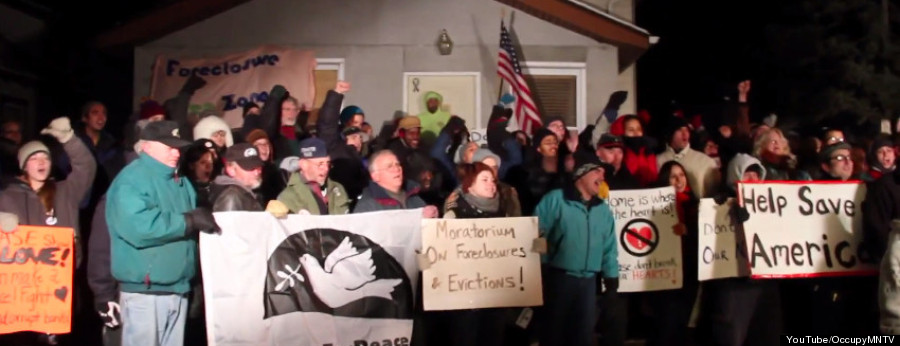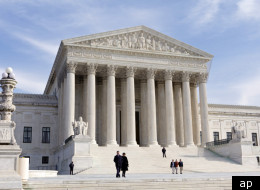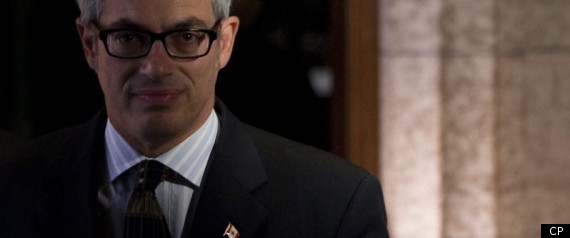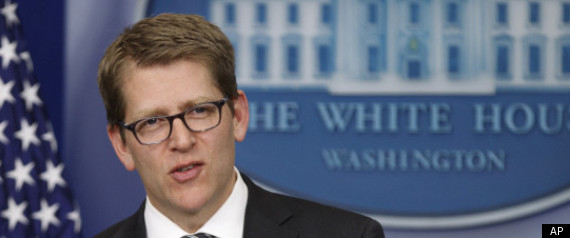Interim Liberal Leader Bob Rae pointed to Conservative-affiliated firms Monday, demanding Prime Minister Stephen Harper hand over relevant information to Elections Canada for their investigation into strange phone calls made during the 2011 federal election.
The Conservatives have denied a connection between the party's national campaign and mysterious telephone calls to voters in as many as 40 ridings. Some of the calls were harassing or abusive and implied they were on behalf of the Liberals or NDP. Others were live or automated calls directing people to the wrong polling stations on election day, May 2, 2011.
Automated calls to voters in Guelph, Ont., have been traced to Racknine, a call centre in Edmonton that was used by at least nine Conservative campaigns in the last election.
In question period, Rae said it was hard to believe the government's answers when the party controlled the information that went to the companies it uses during campaigns. He pointed to Racknine and to Campaign Research, a firm that offers voter identification and get-out-the-vote services.
"The party that has control of the information … with respect to Racknine, with respect to Campaign Research, with respect to in-person calls, robocalls at midnight, during the day," Rae said.
"They're the ones who have to come forward with the information. When is the prime minister of Canada going to take some degree of personal responsibility for what is taking place in the country?"
Campaign Research is the firm that ran a campaign last fall on behalf of the Conservatives in which callers told Mount Royal residents that Montreal MP Irwin Cotler was stepping down from his seat.
Campaign Research said that wasn't in the script provided to callers. Conservative MPs said it was a telephone campaign to identify potential supporters for the next federal election in 2015.
Both Campaign Research founders, Nick Kouvalis and Richard Ciano, have been active in the Conservative Party at the federal and provincial levels.
'Sweeping allegations'
Harper called Rae's comments "broad, sweeping allegations."
"Frankly, in most cases we don't know any details of what the basis of these allegations are. So if the Liberal Party actually has such information, let it provide it to Elections Canada and Elections Canada can investigate it," Harper said.
Interim NDP Leader Nycole Turmel said the calls were all "about trying to stop people from voting, whatever the technology."
"Fixing elections means that by-elections could be called. People could end up in jail," she said.
Liberal and NDP campaigns in 38 ridings say they were hit with the calls. Conservative MP Pierre Poilievre told Evan Solomon, host of CBC's Power & Politics, on Monday that the party has identified 15 ridings in which Conservative supporters got "troubling" calls. Green Party Leader Elizabeth May says her B.C. riding was also targeted.
NDP MP Pat Martin, also speaking to Solomon, said Campaign Research is threatening to sue him for libel over comments he made about the firm.
Former Liberal MP Anthony Rota, who lost his bid for a fourth term in Nipissing-Timiskaming, Ont., by 18 votes, says voter suppression tactics could have cost him the election.
"What I was hearing was, 'Elections Canada told us to go to the wrong poll.' Or they were sending them across town to vote in another location," he told CBC's Julie Van Dusen on Sunday.
MPs were in their ridings on a break week when Postmedia and the Ottawa Citizen revealed Elections Canada is investigating automated robocalls that tried to send voters in Guelph to the wrong polling station.
Harassing callers implied they were Liberals
But other ridings are reporting live calls sending voters to the wrong polling stations, and there are more reports of harassing calls that implied they were from the Liberal Party.
"In our case, the calls were mostly calls impersonating our campaign, being made at all hours of the night," said former Liberal MP Martha Hall Findlay, who lost her Willowdale riding in Toronto by 900 votes.
In some cases, Jewish voters were getting repeated calls during meal time on the Saturday Sabbath.
Other people, generally in ridings with tight races between the Liberal and Conservative candidates, reported late-night calls asking for donations or repeated calls during the day. The reports date back to mid-April.
Cotler, the subject of misleading calls last fall that told voters he was resigning his seat, says he was also targeted during the election.
"Constituents in my riding received misleading robocalls as to where they would be voting," he said Monday morning.
"Those misleading robocalls we reported to the chief electoral officer at the time with respect to the riding. We said that those calls were not only misleading in their facts but also misleading in their characterization of their origin. The people who were called in my riding were sometimes told that they were called by Liberals with respect to that information."
Cotler says Jewish voters in his riding were also hit with calls on the Sabbath, a time his campaign team had decreed no calls would be made.
"That's how we found out about it, because there was some outrage about the fact that they did receive a call on the Sabbath by people who purported to be Liberals."
Elections Canada reported last year it was looking into allegations of mysterious phone calls in Eglinton-Lawrence, a Toronto riding where Conservative Joe Oliver beat Liberal incumbent Joe Volpe. That investigation hasn't been closed.
Jeff Harrietha, a supervisor at a call centre in Northern Ontario, said some staff are thrown into the calls without any training.
"As far as the pollers were concerned, it was like a three-month job, so they would come in with a resume and be on the phone within 15 minutes," said Harrietha, who worked for Responsive Marketing Group, which the Conservatives contracted during the election. Harrietha said he sometimes had to step in when staff weren't polite.
Calls deemed unacceptable
Conservative MP Ed Holder said the misleading calls are unacceptable and "if it's happened at all … should be prosecuted to the full extent of the law."
Holder said his campaign didn't use outside firms and "used our own resources" to get messages to voters, with the exception of calls for "activities or events during the campaign itself."
"We didn't use those calls," Holder said.
Holder's Liberal opponent, Doug Ferguson, released audio Monday of a recorded message deliberately sending a voter to the wrong location well out of her neighbourhood.
Ferguson said until everyone started comparing notes last week they did not realize how widespread these calls were. And the Liberals had other worries after May 2, he pointed out.
"We took a shellacking and, frankly, we weren't in a position to do any serious follow-up," he told CBC Radio's Karina Roman.
Tory staffer quits
Last Friday, a Conservative staffer who had worked on the campaign in Guelph left his job on Parliament Hill. Michael Sona made the news during the election campaign with allegations he'd tried to grab a ballot box at the University of Guelph, arguing it was an illegal poll. He left his job in the office of Eve Adams, parliamentary secretary to the minister of veterans' affairs.
On Sunday, Defence Minister Peter MacKay pointed to Sona's resignation and told CBC News the party doesn't need to investigate any further.
"I think they've identified the individual that was involved in this, and this is certainly not something our party condones," he said.
The opposition parties argue that's impossible, given the enormous lists of telephone numbers needed to orchestrate a cross-Canada campaign and the costs associated with live calls.
Original Article
Source: CBC
Author: Laura Pyton

































